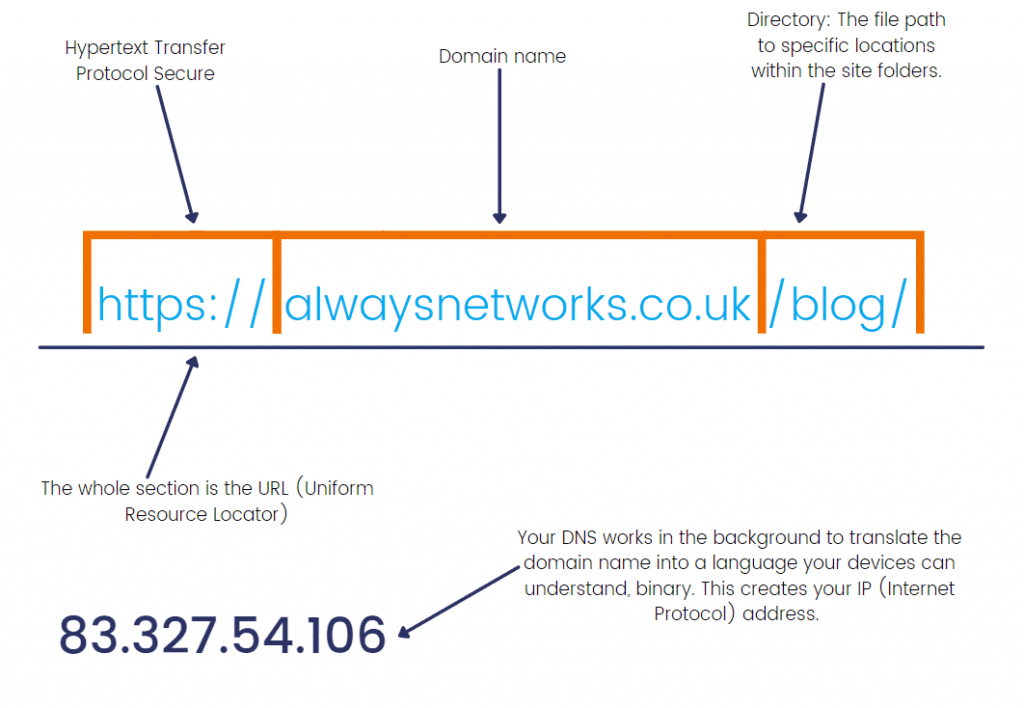DNS, simply put:
DNS (Domain Name System) is one of those IT phrases that is said a lot, and not often explained what it means, or how it affects businesses.
Even if you don’t know what DNS does, it’s always working away in the background every time you make a search on the internet.
What you know and type in as Google.co.uk, is just the sites domain name. Which is fine for us humans, but is no good for our machines. Instead of Google.co.uk, your device knows it as (for example) 142.250.178.14, which is its IP address.
DNS translates the human readable domain names, into the machine readable IP addresses, so that we arrive at the sites we intended to reach.
Thankfully DNS saves us from inputting a set of numbers every time we want to Google something.
But DNS does more than just translate, it stores information, it is a huge database, that operates like an old phonebook, giving your machine all the details it needs to find what you’re looking for online.
Which also means, DNS is used every time someone is wanting to reach your sites online.
Domain Names:
We are all extremely familiar with domain names, we know hundreds of them. Every brand you’re aware of, will utilise that same name, for its domain name, after the @ sign in email addresses, and after www. in web addresses.
If you’ve ever made a business you’ve likely set up a domain name before, or you should have if you wish to have an online presence. Which you should, if you want to extend your businesses reach.
Domain names can be registered from a series of Domain Registrars, like the ones below:

- GoDaddy
- NameCheap
- Namesilo
- HostGator
- 123Reg
Prices can vary for Domain names depending on the demand. But it’s easy to enough to see how much they cost by visiting one of these sites and searching for the name you want.
IP (Internet Protocol) Address:
IP Addresses may be not be for human use, but that doesn’t mean we shouldn’t know why it exists.
It is a numerical instruction that communicates exact information, for example it can look like 142.250.178.14. Like latitude and longitude for a map, It means little to us without the hardware to use it.
Putting all the elements together:

Protect your Domain Name System Settings
This crucial system operates in the background, out of sight, out of mind. But there are security implications if you are not careful with your DNS settings.

If criminals hack the right account, they will be able access your Domain registrars portal, or wherever your DNS settings are configured.
From here they can cause your business serious trouble, as a malicious man in the middle.
Redirecting your post to their house, where they can open, read and adjust anything they want, and forward it onto you, without you knowing of the interception until it is too late.
“Too late” in a lot of cases is when a payment from you to a supplier, disappears in transit. Your suppliers never got their money, you realise the payment you sent, wasn’t to the place or person you expected. For hackers this is as simple as changing the banking information on an invoice they intercepted, adjusted and forwarded along as normal.
Final Thoughts
If you want a successful business, you’ll need an online presence.
With a Domain Name System running in the background to make you accessible online, make sure you’re protecting your DNS settings with good cyber security.
Generate and store your complex passwords with a Password Manager. Enable Two-Factor Authentication to ensure your password isn’t the only thing between your account and a successful breach. Apply some user training and simulated phishing attacks to make sure your employees aren’t likely to accidently hand over their username and passwords to convincing cyber criminals .




